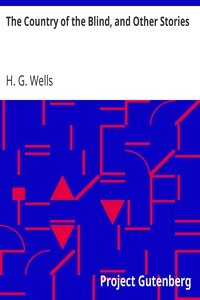The Country of the Blind, and Other Stories, H. G. Wells [top 10 books of all time TXT] 📗

- Author: H. G. Wells
Book online «The Country of the Blind, and Other Stories, H. G. Wells [top 10 books of all time TXT] 📗». Author H. G. Wells
"Eigh?" said Raut, and turned.
"Boil the blood out of you in ... No, you don't!"
"Let me go!" screamed Raut. "Let go my arm!"
With one hand he clutched at the hand-rail, then with both. For a moment the two men stood swaying. Then suddenly, with a violent jerk, Horrocks had twisted him from his hold. He clutched at Horrocks and missed, his foot went back into empty air; in mid-air he twisted himself, and then cheek and shoulder and knee struck the hot cone together.
He clutched the chain by which the cone hung, and the thing sank an infinitesimal amount as he struck it. A circle of glowing red appeared about him, and a tongue of flame, released from the chaos within, flickered up towards him. An intense pain assailed him at the knees, and he could smell the singeing of his hands. He raised himself to his feet, and tried to climb up the chain, and then something struck his head. Black and shining with the moonlight, the throat of the furnace rose about him.
Horrocks, he saw, stood above him by one of the trucks of fuel on the rail. The gesticulating figure was bright and white in the moonlight, and shouting, "Fizzle, you fool! Fizzle, you hunter of women! You hot-blooded hound! Boil! boil! boil!"
Suddenly he caught up a handful of coal out of the truck, and flung it deliberately, lump after lump, at Raut.
"Horrocks!" cried Raut. "Horrocks!"
He clung, crying, to the chain, pulling himself up from the burning of the cone. Each missile Horrocks flung hit him. His clothes charred and glowed, and as he struggled the cone dropped, and a rush of hot, suffocating gas whooped out and burned round him in a swift breath of flame.
His human likeness departed from him. When the momentary red had passed, Horrocks saw a charred, blackened figure, its head streaked with blood, still clutching and fumbling with the chain, and writhing in agony—a cindery animal, an inhuman, monstrous creature that began a sobbing, intermittent shriek.
Abruptly at the sight the ironmaster's anger passed. A deadly sickness came upon him. The heavy odour of burning flesh came drifting up to his nostrils. His sanity returned to him.
"God have mercy upon me!" he cried. "O God! what have I done?"
He knew the thing below him, save that it still moved and felt, was already a dead man—that the blood of the poor wretch must be boiling in his veins. An intense realisation of that agony came to his mind, and overcame every other feeling. For a moment he stood irresolute, and then, turning to the truck, he hastily tilted its contents upon the struggling thing that had once been a man. The mass fell with a thud, and went radiating over the cone. With the thud the shriek ended, and a boiling confusion of smoke, dust, and flame came rushing up towards him. As it passed, he saw the cone clear again.
Then he staggered back, and stood trembling, clinging to the rail with both hands. His lips moved, but no words came to them.
Down below was the sound of voices and running steps. The clangour of rolling in the shed ceased abruptly.
III. — THE STOLEN BACILLUS.
"This again," said the Bacteriologist, slipping a glass slide under the microscope, "is well,—a preparation of the Bacillus of cholera—the cholera germ."
The pale-faced man peered down the microscope. He was evidently not accustomed to that kind of thing, and held a limp white hand over his disengaged eye. "I see very little," he said.
"Touch this screw," said the Bacteriologist; "perhaps the microscope is out of focus for you. Eyes vary so much. Just the fraction of a turn this way or that."
"Ah! now I see," said the visitor. "Not so very much to see after all. Little streaks and shreds of pink. And yet those little particles, those mere atomies, might multiply and devastate a city! Wonderful!"
He stood up, and releasing the glass slip from the microscope, held it in his hand towards the window. "Scarcely visible," he said, scrutinising the preparation. He hesitated. "Are these—alive? Are they dangerous now?"
"Those have been stained and killed," said the Bacteriologist. "I wish, for my own part, we could kill and stain every one of them in the universe."
"I suppose," the pale man said, with a slight smile, 'that you scarcely care to have such things about you in the living—in the active state?"
"On the contrary, we are obliged to," said the Bacteriologist. "Here, for instance—" He walked across the room and took up one of several sealed tubes. "Here is the living thing. This is a cultivation of the actual living disease bacteria." He hesitated. "Bottled cholera, so to speak."
A slight gleam of satisfaction appeared momentarily in the face of the pale man. "It's a deadly thing to have in your possession," he said, devouring the little tube with his eyes. The Bacteriologist watched the morbid pleasure in his visitor's expression. This man, who had visited him that afternoon with a note of introduction from an old friend, interested him from the very contrast of their dispositions. The lank black hair and deep grey eyes, the haggard expression and nervous manner, the fitful yet keen interest of his visitor were a novel change from the phlegmatic deliberations of the ordinary scientific worker with whom the Bacteriologist chiefly associated. It was perhaps natural, with a hearer evidently so impressionable to the lethal nature of; his topic, to take the most effective aspect of the matter.
He held the tube in his hand thoughtfully. "Yes, here is the pestilence imprisoned. Only break such a little tube as this into a supply of drinking-water, say to these minute particles of life that one must needs stain and examine with the highest powers of the microscope even to see, and that one can neither smell nor taste—say to them, 'Go forth, increase and multiply, and replenish the cisterns,' and death—mysterious, untraceable death, death swift and terrible, death full of pain and indignity—would be released upon this city, and go hither and thither seeking his victims. Here he would take the husband from the wife, here the child from its mother, here the statesman from his duty, and here the toiler from his trouble. He would follow the water-mains, creeping along streets, picking out and punishing a house here and a house there where they did not boil their drinking-water, creeping into the wells of the mineral water makers, getting washed into salad, and lying dormant in ices. He would wait ready to be drunk in the horse-troughs, and by unwary children in the public fountains. He would soak into the soil, to reappear in springs and wells at a thousand unexpected places. Once start him at the water supply, and before we could ring him in, and catch him again, he would have decimated the metropolis."
He stopped abruptly. He had been told rhetoric was his weakness.





Comments (0)